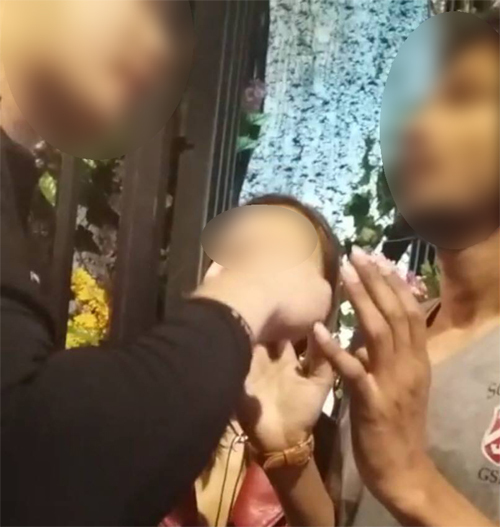Itaewon bar accused of discriminating against Indian
By Ock Hyun-juPublished : June 7, 2017 - 15:55
When Kislay Kumar went out with his friends in a multicultural district in Seoul to enjoy his Friday night, the 25-year-old man did not imagine that his night would be ruined just because he was Indian.
In the early hours of Saturday morning, Kumar was denied entry to a bar in Itaewon because of his nationality. His other friends from Russia, Colombia, Afghanistan, Canada and France were allowed entry.
“When I was in line, the bouncer asked for our identification cards. I showed him my ID card and he did not let me in. He just said, ‘No Indian,’” Kumar told The Korea Herald. “I asked him why, he said it was a rule. But he did not explain why it was a rule.”
“It was very insulting to me. There were many people standing over there in a long queue and watching me be not allowed inside the bar,” he said. “I felt criminalized, as if I did something wrong.”
In the early hours of Saturday morning, Kumar was denied entry to a bar in Itaewon because of his nationality. His other friends from Russia, Colombia, Afghanistan, Canada and France were allowed entry.
“When I was in line, the bouncer asked for our identification cards. I showed him my ID card and he did not let me in. He just said, ‘No Indian,’” Kumar told The Korea Herald. “I asked him why, he said it was a rule. But he did not explain why it was a rule.”
“It was very insulting to me. There were many people standing over there in a long queue and watching me be not allowed inside the bar,” he said. “I felt criminalized, as if I did something wrong.”
The bar owner could not be reached for a comment. But an official from the bar claimed no knowledge of such a discriminative action by bouncers hired by its subcontractor.
“We did not know the security guards were restricting the entry of people from certain countries. We are checking the specific circumstances and we are sorry to our customers,” the official was quoted as saying by a local daily Dong-A Ilbo.
Kumar’s experience with the bar went viral on social media after his friend Yann Dumont, a 22-year-old French national, posted a video in which Kumar was refused entry to the club.
In the video, the male bouncer was heard saying: “No Indians. It is a rule. No Kazakhstan, No Pakistan, No Mongolia, No Saudi Arabia and No Egypt. It is a rule.”
As Kumar pressed as to why, the security guard kept on saying “it is a rule.” When Kumar warned that he would call the police, the guard responded: “Police? Yes. Call them now. Please get out of here.”
“It was not acceptable, but at the same time we knew that nothing could legally be done in order to solve this. So I decided to post the video to show that these kinds of situations still happen,” Dumont said.
“Many Korean people are not aware that such discrimination takes place in their country, as this obviously does not happen to them,” he added.
Other expats claimed to have experienced the same treatment at other clubs in Korea.
“Unfortunately, it’s nothing new here in Korea and to Korean standards it’s not extreme. It happens frequently to foreigners of all races,” wrote Peter Drake on Facebook. “This has happened to me before and I am a white American.”

Though it is not a general trend, there are still Korean-only bars in nightlife districts that bluntly ban foreign patrons’ entry all together or discriminate against them based on race.
Business owners often cite their freedom of private businesses to decide which customers they serve at their venues or their past experience with foreign customers not respecting house rules.
In 2014, a pub in Itaewon caused controversy after posting handwritten signs that read, “We apologize but due to the Ebola virus, we are not accepting Africans at the moment.”
An official from Korea’s human rights watchdog said the nation still lags behind international standards in terms of combatting racism and embracing diversity.
“We have received complaints related to racial discrimination. South Korea’s awareness of human rights has been rising for the past decade, but it is still not living up to the global standards,” said an official from the National Human Rights Commission of Korea.
“I should investigate the case first. But if the establishment denied entry just because he was Indian, it would constitute as racial discrimination.”
The United Nations special rapporteur on racism, Mutuma Ruteere, urged South Korea in 2014 to enact an anti-discrimination law to curb racism and xenophobia, given the country’s history of ethnic and cultural homogeneity.
There is still no law banning discrimination based on such grounds as race, gender, religion or sexuality, with a bill to root out discrimination having failed to pass through the National Assembly for the past decade.
According to a 2015 survey of 4,000 adults by the Ministry of Gender and Family Affairs, 25.7 percent of respondents said that they didn’t want people of different races as neighbors.
For Kumar, South Korea is a wonderful country that he fell in love with from the moment he landed here two years ago. The experience was horrible, but it did not really change how he feels about Korea or Korean people.
“I know not all Koreans are racist,” he said. “I got many responses from Korean friends who said what happened is wrong and unacceptable.”
“As a foreigner, I know I cannot make a change. But I am just trying to raise awareness because I don’t want it to happen to others.”
By Ock Hyun-ju (laeticia.ock@heraldcorp.com)
-
Articles by Ock Hyun-ju



















![[Today’s K-pop] Treasure to publish magazine for debut anniversary](http://res.heraldm.com/phpwas/restmb_idxmake.php?idx=642&simg=/content/image/2024/07/26/20240726050551_0.jpg&u=)